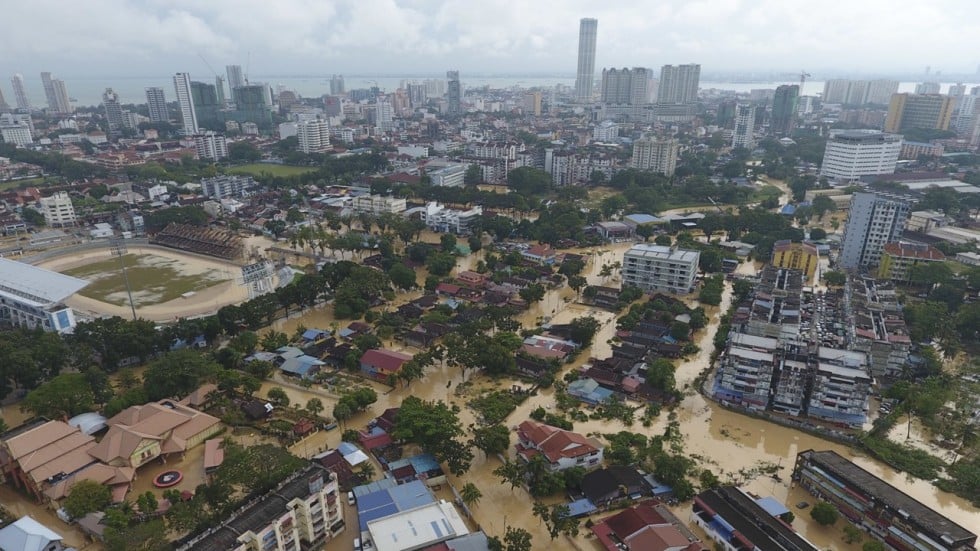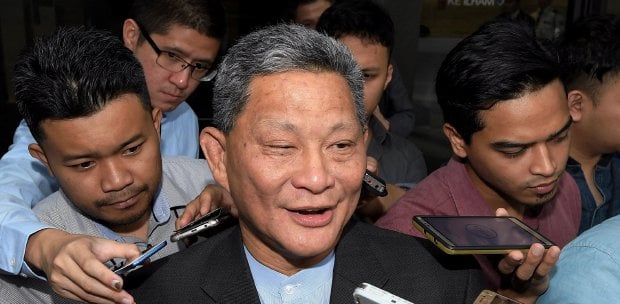 |
Mediocre future? If selection at the
matriculation level is not based on meritocracy, the quality of our
tertiary institutions will be diluted and they will produce only
mediocre graduates eventually.
— Filepic
|
Affirmative action should be based entirely on need because a poor Malay student needs a scholarship just as badly as a poor Indian or Chinese student.
THE debate over the intake of students into matriculation colleges in the country is an annual one, just like the offer of government scholarships. I have been a keen follower of this subject for many years and there has never been a year without complaints being made about the selection process.
It is always about top scoring non-Malay students in the SPM examination not being offered places while others with lower grades walk into colleges. This is nothing new in Malaysia, actually.
So why the intense debate now, with leaders from both sides of the political divide openly defending or criticising the quota system applied to the selection?
For those who may not know, the 90:10 (bumiputra:non-bumiputra) quota has been in existence since 2005, according to records. There have been “political adjustments” in the past when more non-Malay students were offered seats, but these were one off actions presumably during election years to woo votes.
One of the reasons for the deluge of criticisms now – some from leaders in the Pakatan Harapan coalition itself – could be due to the new kind of democracy that we expect under the new government.
There have been unverified reports of heated arguments in the Cabinet among ministers, with some defending the policy and others against a quota system that appears to be extremely unfair to Malaysians as they are being deprived of one of their rights in their motherland. Yes, Malaysia is the motherland for most of us and not India or China or Indonesia.
Maybe our government leaders should see the extent of hatred in the social media clips and hate messages that have been circulating expressing the anger, fear and frustrations of non-Malays.
And, of course, some unfairly blame Prime Minister Tun Dr Mahathir Mohamad, seeing him as the man who started this quota system previously and who is now perpetuating it.
What I gather from media reports and social media is that people feel Pakatan has moved away from its election promise of building a more equitable society that will not deprive any community of fair and equal access to tertiary education.
Hearing this promise, among others, Malaysians placed much hope on Pakatan building a new society for all races. When they see it is not happening, or becoming worse in some instances, they react.
I don’t think it is wrong for every top performing student from the B40 (lower income) category to feel devastated if he or she is deprived of a seat while lower-performing schoolmates are offered places. It makes me wonder if the selection committee has some ulterior motive to create this situation to benefit the opposition.
The matriculation programme, an affirmative action policy, started as a system that was based on wonderful ideals, so most Malaysians did not question its implementation initially. But for some reason, it has come to be regarded as pernicious now, as it appears to benefit only one community.
I believe that this practice has led – whether consciously or not – to excellence being suppressed to the point of creating a culture of mediocrity in many aspects of life. This is not going to change even if another government comes into power as long as the policy is not tweaked to meet the changing world.
OK, the government decided to add another 15,000 seats to the 25,000 given out in an attempt to quell the current outcry. Based on the quota, an additional 1,500 non-bumiputra students will now be given college places. At the same time, there will be another 13,500 bumiputra students added, which means there is a high possibility of the need to take in weak students just to meet the quota.
If this practice goes on, it will continue to dilute the quality of our tertiary institutions, producing only mediocre graduates eventually.
As a result, striving for excellence has become secondary, with some Malaysians feeling it is their right to be given university or college seats, or positions and promotions later, because they belong to one race. This is widely in existence and is being perpetuated despite the new government’s promises.
Winning votes at any cost has become as addiction with our politicians, it seems. Are we going to let their thirst for power destroy our nation?
I do agree that most Malaysians are not ready for an absolute meritocratic society because, as some critics say, it will create reverse discrimination where the majority will lose out to a minority.
But I believe, slowly but surely, the balance has to change for non-bumiputra citizens. After all, we are not asking for what is not ours, only what we deserve.
There is no discrimination when we pay our taxes and our only home is Malaysia. And I am sure the first two lines of our national anthem run deep in our hearts: “Negaraku, tanah tumpanya darahku (My country, for whom I will shed my blood)” are words that most of us carry in our hearts, and we are indeed ready to take up arms to defend the nation from any threat, as shown in the past.
We are in the 21st century now when affirmative action should not be based on a citizen’s skin colour or creed. Affirmative action should be based on one’s need because a poor Malay student needs a scholarship just as badly as a poor Indian or Chinese student.
There are many Malaysians who think that we’ve arrived at a time when affirmative action needs to be dismantled slowly, with a specified time frame given.
But this is a highly contentious issue and the government must tread carefully, as any sudden deprivation will have a strong social reaction.
We should create a belief that a love of learning will gain Malay-sians far more than any affirmative action laws we might pass.
But this change should come from within, as no quota or law can make us realise this. If Malaysians are not willing to work hard and earn their places or positions and instead wait for hand-outs all their lives, we will fail as a nation eventually.

Let’s stop breaking the hearts of Malaysians when it comes to education. All students need a helping hand, irrespective of who they are, as we march onwards towards becoming a respected First World nation.
Read more
Who does Malaysia belong to?
 |
Great responsibility: To move forward, we
Malaysians have to take responsibility for the destiny of the nation on
our own shoulders.
|
The Federal Constitution does not confer any rights to 'ownership of the nation based on ethnicity or religion.
TO whom does Malaysia belong to may sound like a hilarious question, but do not overestimate the capacity to which the human mind is used.
Experience and observation will tell you that many of us (sometimes me included), often make a choice of not thinking about things based on facts. Instead, we form conclusions based on conjectures and other people’s uninformed opinions.
So who does Malaysia belong to?
There are many ways of approaching this question. As I often tell the audience in my talks about “thinking”, we have to understand the question first before we can even attempt to seek an answer.
For example, if we think of Malaysia as a politico-legal entity – a “nation” – then it becomes obvious that the question relates to an examination of the legal structure of the nation.
Seeking the answer may lead to further questions. It is no longer a “kedai kopi” kind of discussion where everyone wants to have a say simply because they can make sounds with their mouths. That can be a tiring experience, at least for me.
So when then did the politico-legal entity called “Malaysia” come into being’?
Malaysia was legally born on Sept 16, 1963, when the Federation of Malaya (West Malaysia), Singapore, Sabah and Sarawak formed the larger Federation of Malaysia. About two years later, the Malaysian Parliament passed a Bill to separate Singapore from the Federation. Hence, from 1965, Malaysia is legally made up of what is know today as West and East Malaysia.
Obviously, we do not think that the Federation of Malaysia had come about as a result of some casual social chat between the leaders of the respective states over teh tarik.
There were meetings and discussions back and forth between the parties and they came up with an agreement to join together as the Federation of Malaysia vide the Malaysia Agreement 1963.
Whenever there is an agreement, there are terms and conditions for the parties to abide by. The agreement, however, is not the subject of this article.
When you see Malaysia as a legal entity, you will immediately ask a few other questions: How is Malaysia managed as a nation and who manages it? What are the rights, duties, obligations, and privileges of the “members” of this Federation of Malaysia? What about “non-members” who are present in the Federation?
These kind of questions have to be asked and thought about. We can understand that the “members” refer to the states that make up Malaysia and most of the human beings who live here.
The human beings make up the citizens and the non-citizens and well, some illegal immigrants. Each of these human beings have different legal status in our country.
When we speak of “belong”, we think in terms of ownership, management, rights and privileges. How is it possible to say something belongs to you if you do not own it, or do not have the right to manage it?
Legally, the nation is “owned” by the citizens of the country because they are authorised to “manage” the country and to determine its destiny. The citizens can either bring the nation to a high level of civilisation or bring it down to a failed state.
The basic framework of the rights of the citizens and how the nation is to be managed is provided for in the Federal Constitution, correctly termed by the constitutional law expert Professor Emeritus Dr Shad Saleem Faruqi as the “document of destiny”.
How we interpret the Constitution and if at all we give “life” to the provisions in the Constitution will shape the destiny of the nation. The Constitution is the supreme law of the land and it is an extremely important document that every citizen should know.
It is important to note that the Constitution does not confer any rights to “ownership” of the nation based on ethnicity or religion.
Every citizen is equal before the law save for particular laws relevant to particular groups of citizens due to the diverse nature of our citizenry. The Constitution clearly spells out the fundamental liberties that all citizens have a right to enjoy in Part II, and the manner in which the Federation of Malaysia is to be managed in Part IV and VI.
There are also provisions regarding the civil service (Part X), the judiciary (Part IX) and elections (Part VIII), to name a few.
In this regard, therefore, any claims to ownership of the country in terms of religion or ethnicity is therefore not supported by the reality of the law.
It is also a divisive and bigoted perspective which will harm the nation in the long run. In layperson terms, Malaysia legally belongs to all Malaysians and they have equal rights and duties to develop Malaysia and to live in it peacefully.
Do not behave as if the country belongs only to the politicians in power. We should have learnt this lesson by now. Ownership does not come without an effort. You have to protect the nation as how you protect your home or property in accordance with the laws.
If you really think this country belongs to you, then you should not simply be subservient to unjust laws, if any.
You have to challenge it and ensure that it is consistent with the provisions in the Constitution and move your parliamentary representatives to pass just laws that will protect you and develop the nation wholesomely. Ownership comes with real responsibility and not with mere slogans, rhetoric or political speeches.
It is most unfortunate that despite having achieved independence for more than 60 years, there are still many citizens who are ignorant of the Constitution.
This I believe, is largely due to their own apathy and also due to the unfortunate Malaysian culture of taking the politicians to be their teachers.

Hence, political narratives that affront common intelligence are mistaken to be the law by the feeble minded amongst us. We have to move forward and take responsibility for the destiny of the nation on our own shoulders.
Related post:

































